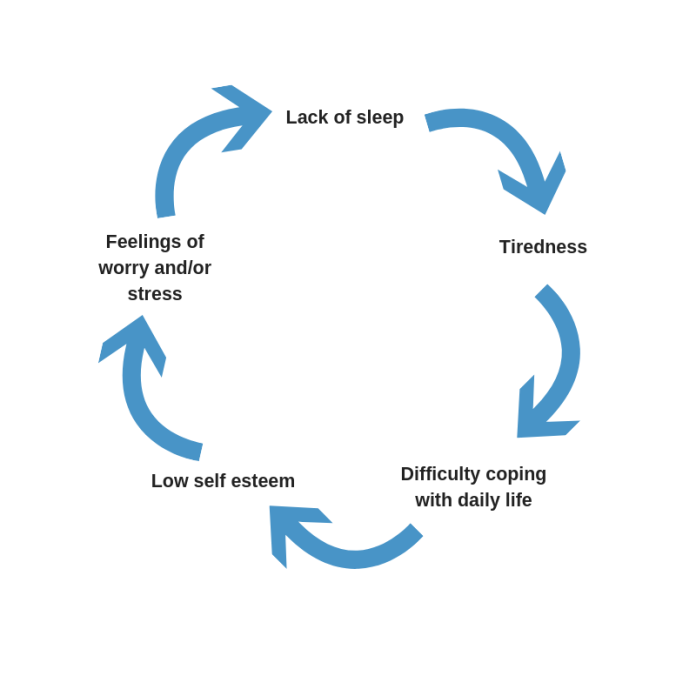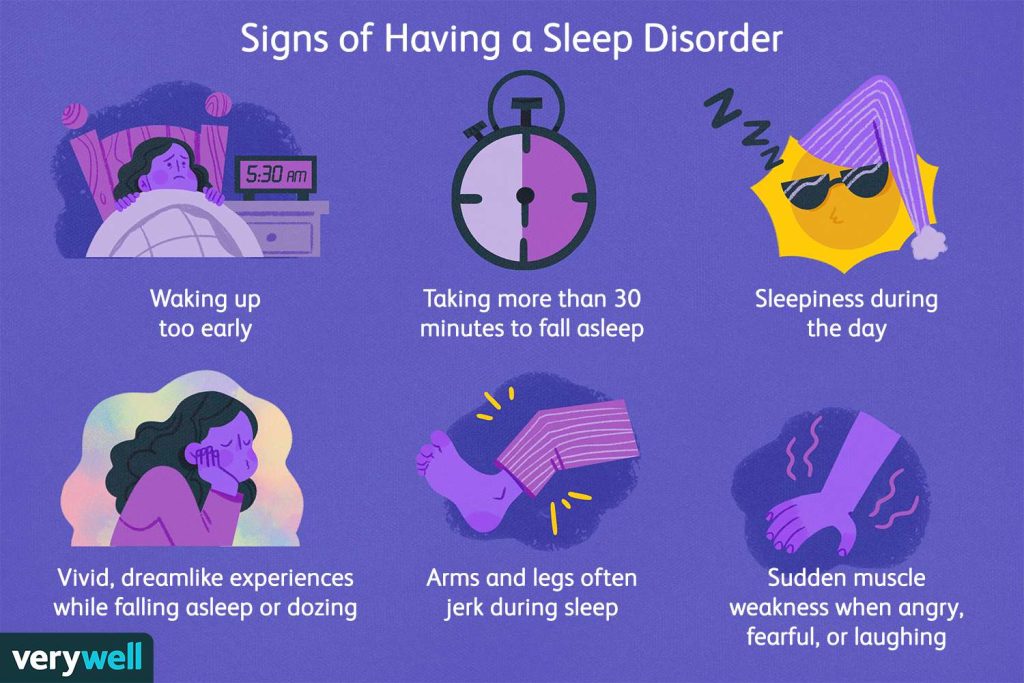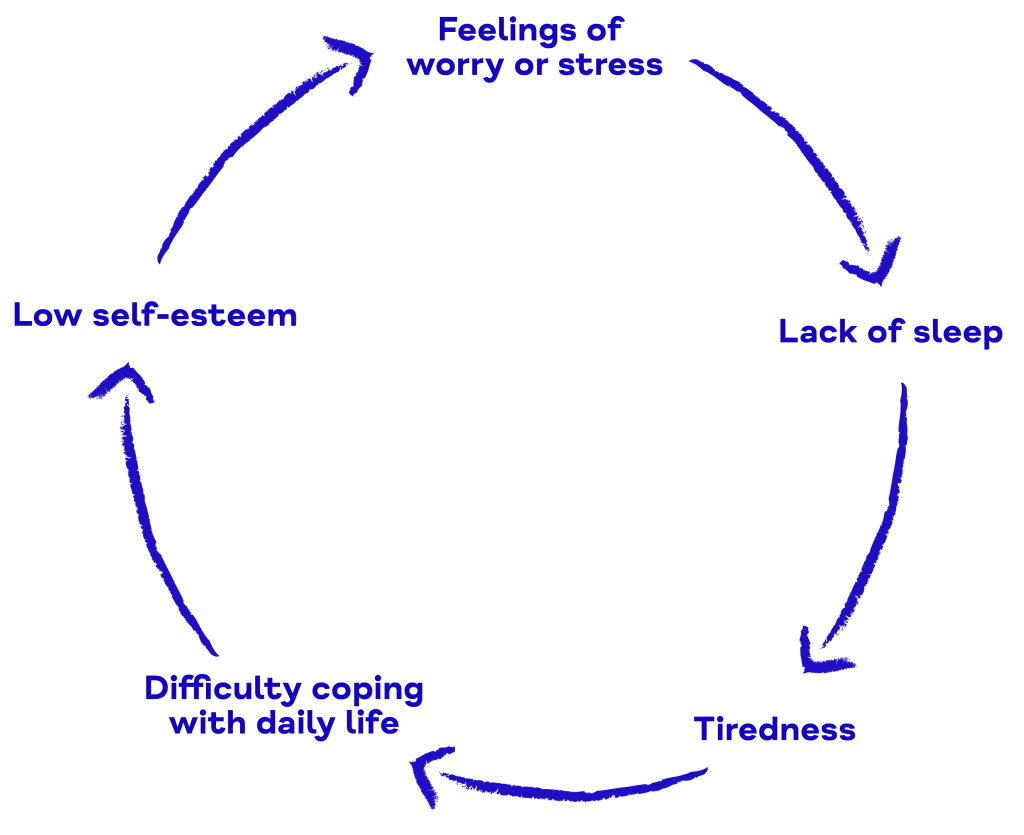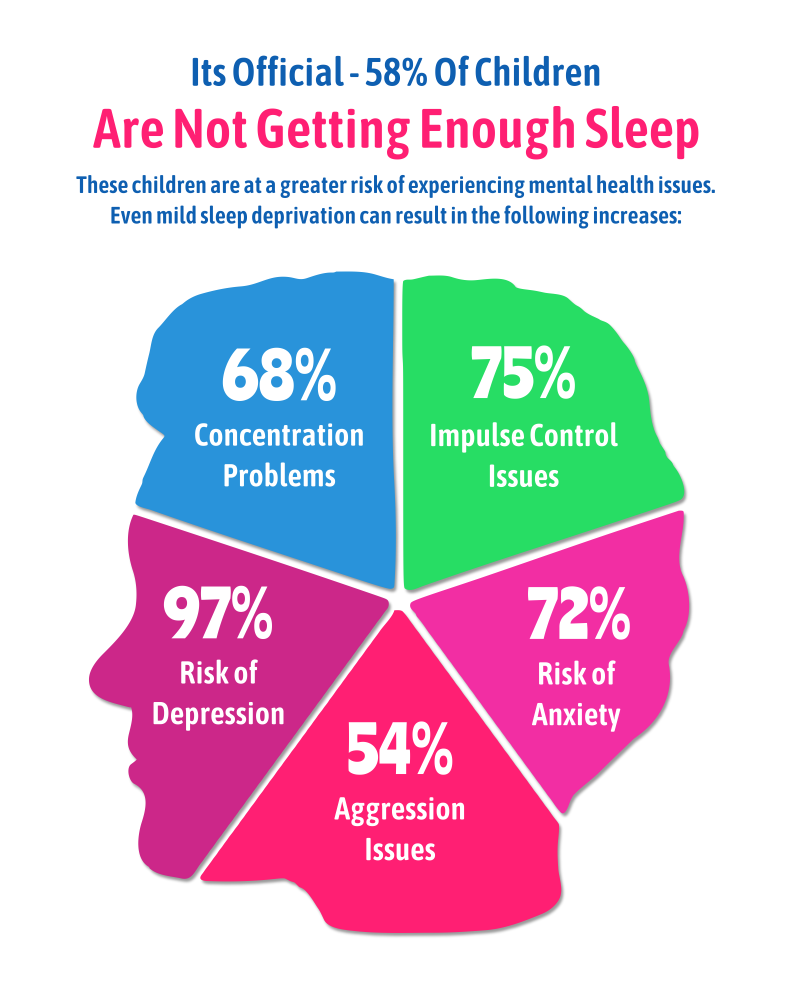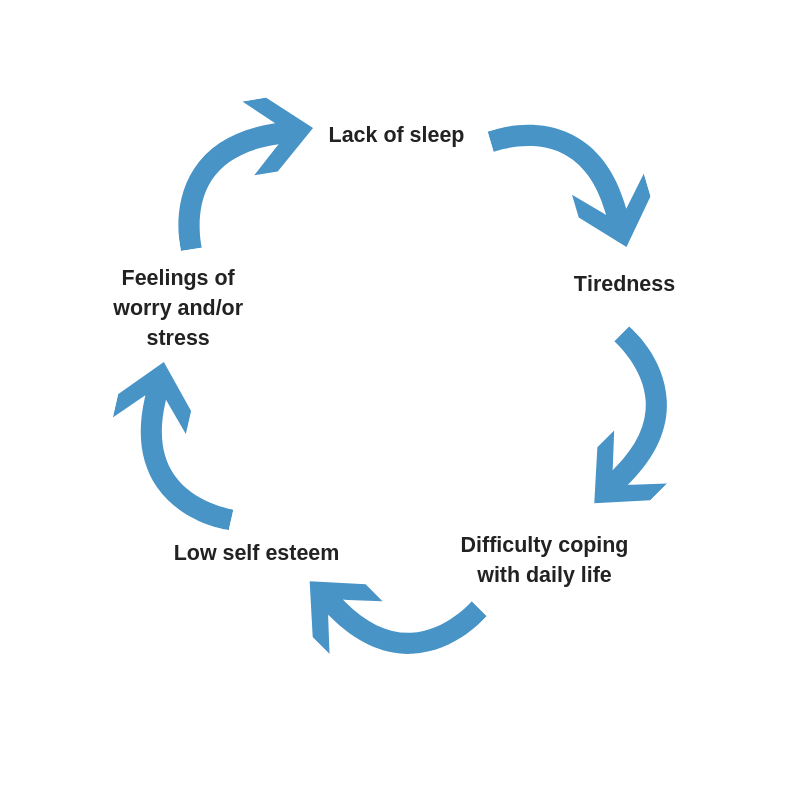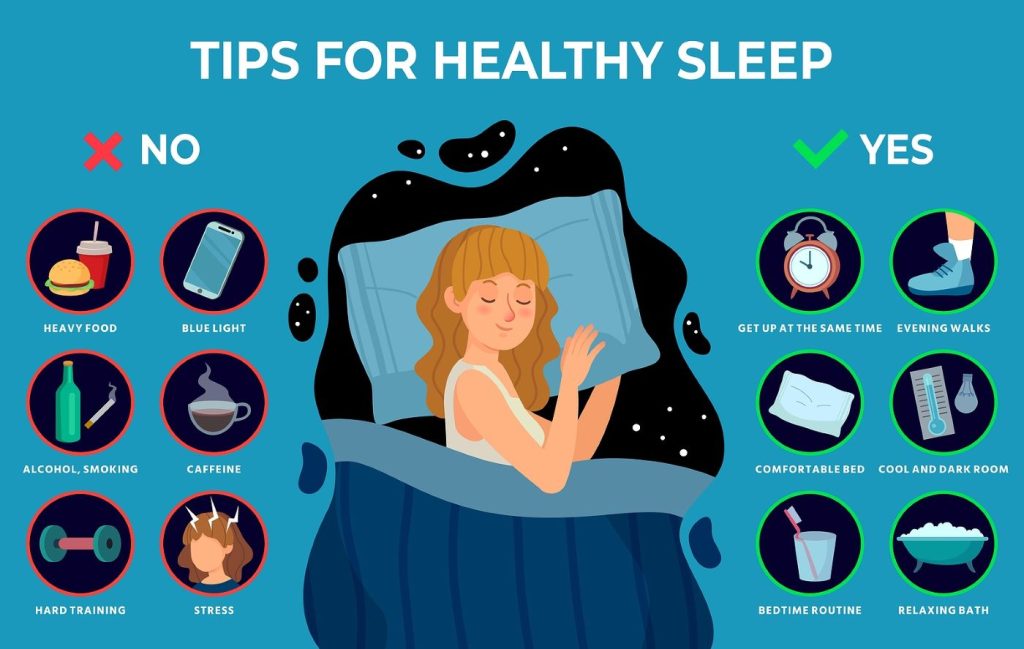This article explores the fascinating link between sleep and mental health.
Sleep, a fundamental aspect of our lives, significantly shapes our overall mental well-being.
The quality and duration of our sleep can significantly impact our mental health, while mental health conditions can also disrupt our sleep patterns.
Understanding this intricate connection can give us valuable insights into improving our sleep and mental well-being.
Review contents
Effects of Sleep on Mental Health
Getting enough quality sleep is crucial for maintaining good mental health. Sleep plays a significant role in our well-being, including emotional regulation, mood, anxiety, and depression.
When you don’t get enough sleep or experience sleep disturbances, it can hurt your mental health.
Sleep and Emotional Regulation
Sleep deprivation can significantly affect our ability to regulate our emotions effectively. When you are sleep-deprived, you may experience heightened emotional reactivity and have difficulty managing and controlling your emotions.
This can lead to mood swings, irritability, and a decreased ability to cope with stressors in your daily life. Good sleep hygiene and sufficient sleep can help regulate and stabilize your emotions.
Sleep and Mood Disorders
There is a bidirectional relationship between sleep and mood disorders. Insufficient sleep can contribute to the development and exacerbation of mood disorders such as bipolar disorder and major depressive disorder.
Individuals with mood disorders often experience sleep disturbances, including insomnia or hypersomnia. Addressing sleep issues is an essential component of managing mood disorders.
Sleep and Anxiety Disorders
Anxiety disorders and sleep problems frequently coexist. Lack of sleep or poor sleep quality can increase anxiety symptoms and make it harder to cope with anxiety-provoking situations.
On the other hand, anxiety can also disrupt sleep, leading to difficulties falling asleep, staying asleep, or experiencing nightmares. Developing healthy sleep habits can help alleviate anxiety symptoms and improve overall well-being.
Sleep and Depression
Depression and sleep disturbances often go hand in hand. Many individuals with depression experience insomnia, characterized by difficulty falling asleep, staying asleep, or experiencing early morning awakening.
On the other hand, some individuals may experience hypersomnia, where they sleep excessively but still feel tired. Treating sleep disturbances can enhance the effectiveness of depression treatment and improve overall mood and functioning.
Sleep and Bipolar Disorder
Bipolar disorder is a psychiatric condition characterized by alternating periods of mania and depression. Sleep plays a crucial role in managing bipolar disorder symptoms.
Disrupted sleep patterns, such as decreased need for sleep during manic episodes or increased need for sleep during depressive episodes, are common in individuals with bipolar disorder.
Establishing a consistent sleep routine and ensuring adequate sleep duration can contribute to mood stability and overall well-being for individuals with bipolar disorder.
Role of Sleep in Cognitive Functions
Besides its impact on emotional well-being, sleep also plays a vital role in various cognitive functions, including memory, attention, decision-making, and problem-solving. Getting sufficient and restorative sleep is essential for optimal cognitive functioning.
Sleep and Memory
During sleep, consolidation of memories takes place, helping to solidify and strengthen what we have learned throughout the day.
Insufficient sleep can impair memory encoding and retrieval processes, leading to learning and retaining information difficulties. Good sleep hygiene practices, such as ensuring a consistent sleep schedule and allowing enough time for sleep, can enhance memory retention and cognitive performance.
Sleep and Attention
Sleep deprivation can significantly impact our ability to focus and sustain attention. Lack of sleep affects the brain’s prefrontal cortex, which plays a crucial role in attention and concentration.
When you are sleep-deprived, you may find it challenging to concentrate on tasks, make quick decisions, or ignore distractions. A consistent sleep routine and adequate sleep duration are essential for optimal attention and cognitive performance.
Sleep and Decision Making
Sleep has a significant influence on our ability to make sound decisions. When you are sleep-deprived, your judgment and decision-making abilities may be compromised.
Assessing risks accurately, evaluating consequences, and making rational choices becomes challenging. Prioritizing sleep can enhance your cognitive abilities and positively impact decision-making processes.
Sleep and Problem Solving
Getting enough sleep can enhance problem-solving skills and creativity. During sleep, our brain processes information and connects concepts, promoting creative thinking and problem-solving abilities.
Insufficient sleep can hinder these cognitive processes, making it harder to develop innovative solutions. Prioritizing a good night’s sleep can boost your problem-solving abilities and productivity.
Sleep Disorders and Mental Health
Sleep disorders are commonly associated with mental health issues. Understanding the relationship between sleep disorders and mental health is essential for effective diagnosis and treatment.
Insomnia and Mental Health
Insomnia, characterized by difficulty falling asleep, staying asleep, or experiencing non-restorative sleep, is closely linked to mental health problems. Insomnia can be both a symptom and a risk factor for disorders such as depression, anxiety, and bipolar disorder.
Treating underlying mental health conditions and addressing insomnia through cognitive-behavioral therapy (CBT-I) or medication can significantly improve sleep quality and overall well-being.
Sleep Apnea and Mental Health
Sleep apnea, a sleep disorder characterized by interrupted breathing during sleep, also has links to mental health issues. Sleep apnea patients often experience excessive daytime sleepiness, low mood, and decreased cognitive functioning.
Continuous positive airway pressure (CPAP) therapy, lifestyle changes, and weight management can help alleviate sleep apnea symptoms and improve mental health outcomes.
Narcolepsy and Mental Health
Narcolepsy, a neurological disorder characterized by excessive daytime sleepiness, can significantly impact mental health. Individuals with narcolepsy may experience mood disorders, memory difficulties, and impaired concentration.
Proper diagnosis and management of narcolepsy, including medication and lifestyle adjustments, are crucial for improving mental health outcomes.
Restless Legs Syndrome (RLS) and Mental Health
Restless Legs Syndrome (RLS), characterized by an uncontrollable urge to move the legs, can disrupt sleep and impact mental health. Sleep disturbances caused by RLS can contribute to anxiety and depression.
Treating RLS symptoms, including medication and lifestyle modifications, can help improve sleep quality and alleviate associated mental health issues.
Bidirectional Relationship: Mental Health Impacting Sleep
The relationship between mental health and sleep is bidirectional, meaning mental health conditions can impact sleep quality and quantity.
Effects of Mental Health on Sleep
Mental health conditions like anxiety, depression, and post-traumatic stress disorder (PTSD) can significantly impact sleep patterns.
Anxiety and intrusive thoughts can make it difficult to fall asleep or stay asleep, leading to insomnia. Similarly, depression can disrupt regular sleep-wake cycles, resulting in sleep disturbances. Addressing underlying mental health issues is essential for improving sleep quality.
Anxiety and Sleep
Anxiety can significantly impact sleep. Excessive worrying, racing thoughts, and physical symptoms of anxiety can make it challenging to relax and fall asleep.
Additionally, anxiety-related nightmares and night sweats can interrupt sleep during the night. Treatment approaches such as therapy, medication, and relaxation techniques can help manage anxiety symptoms and promote better sleep.
Depression and Sleep
Depression often results in changes in sleep patterns. Some individuals with depression experience insomnia, while others may have hypersomnia.
Sleep disturbances in depression can also lead to fatigue, low energy levels, and difficulty initiating and maintaining sleep. Treating depression through therapy and medication can help improve sleep quality and restore healthy sleep patterns.
Post-Traumatic Stress Disorder (PTSD) and Sleep
PTSD can significantly impact sleep, as individuals with PTSD often experience nightmares, intrusive memories, and hyperarousal during the night.
This can lead to fragmented sleep and sleep-related fears. Effective treatment for PTSD, including therapy approaches like eye movement desensitization and reprocessing (EMDR), can help manage sleep disturbances and improve overall well-being.
Sleep Deprivation and Mental Health
Sleep deprivation, whether chronic or acute, can harm mental health.
Effects of Sleep Deprivation on Mental Health
Lack of sleep can lead to various mental health issues, including an increased risk of developing mood disorders, difficulty regulating emotions, and diminished cognitive abilities. Chronic sleep deprivation can contribute to developing psychiatric conditions and exacerbate existing mental health issues.
Sleep Deprivation and Increased Risk of Mental Disorders
Sleep deprivation increases the risk of developing mental disorders such as anxiety disorders, depressive disorders, and bipolar disorder. Inadequate sleep impacts neurotransmitters, hormonal regulation, and brain function, leading to changes in mood and cognitive processes. Prioritizing sufficient and quality sleep is crucial for reducing the risk of mental health disorders.
Sleep Deprivation and Poor Emotional Well-being
When you are sleep-deprived, you may experience heightened irritability, increased stress levels, and difficulties managing emotions. Lack of sleep affects the brain’s emotional regulation processes, making it harder to cope with daily stressors and challenges. Enhancing sleep hygiene practices and ensuring adequate sleep duration can significantly improve emotional well-being and overall mental health.
Sleep Hygiene and Mental Health
Practicing good sleep hygiene is essential for promoting optimal mental health and well-being.
Establishing a Regular Sleep Schedule
Maintaining a consistent sleep schedule helps regulate your body’s internal clock and promotes healthy sleep patterns. Try to go to bed and wake up simultaneously each day, even on weekends.
Creating a Sleep-Conducive Environment
Your sleep environment plays a crucial role in the quality of your sleep. Make sure your bedroom is quiet, dark, and at a comfortable temperature. Use comfortable bedding and invest in a supportive mattress and pillow.
Avoiding Stimulants and Alcohol
Stimulants such as caffeine and nicotine can interfere with your ability to fall and stay asleep. Avoid consuming these substances close to bedtime. While alcohol can initially make you tired, it can disrupt sleep later at night, leading to poor sleep quality.
Engaging in Relaxation Techniques
Incorporating relaxation techniques into your bedtime routine can help promote better sleep. Deep breathing, meditation, progressive muscle relaxation, and aromatherapy can help calm the mind and prepare your body for sleep.
Limiting Electronics Before Bed
The blue light emitted by electronic devices such as smartphones, tablets, and computers can interfere with your body’s natural sleep-wake cycle. Avoid using electronic devices at least an hour before bed and enjoy relaxing activities like reading a book or taking a warm bath.
Treatment Approaches: Sleep and Mental Health
Various treatment approaches can help address sleep issues and improve mental health outcomes.
Cognitive Behavioral Therapy for Insomnia (CBT-I)
CBT-I is a highly effective therapy approach specifically designed to treat insomnia. It focuses on changing thought patterns and behaviors that contribute to poor sleep. CBT-I can help identify and modify negative beliefs about sleep, establish a consistent sleep routine, and promote relaxation techniques for better sleep.
Medications for Sleep and Mental Health Disorders
Medications may sometimes be prescribed to address sleep issues and mental health disorders. Sleep aids, such as short-term use of hypnotic medications, can help manage acute insomnia. Antidepressants and mood stabilizers may also address sleep disturbances associated with mental health conditions.
Integrated Therapy for Comorbid Sleep and Mental Health Issues
Integrated therapy approaches are beneficial when someone is experiencing both sleep and mental health issues simultaneously. These approaches involve collaboration between mental health professionals and sleep specialists to develop personalized treatment plans addressing both conditions.
Impact of COVID-19 on Sleep and Mental Health
The COVID-19 pandemic has significantly impacted sleep and mental health worldwide.
Sleep Disturbances During the Pandemic
The pandemic has brought uncertainty, stress, and anxiety into our lives, impacting our sleep quality. Many individuals have reported difficulties falling asleep, staying asleep, or experiencing vivid nightmares during this time. Increased screen time, disrupted routines, and feelings of isolation contribute to sleep disturbances.
Increased Stress and Anxiety
The pandemic has created an environment of increased stress and anxiety for many individuals. The fear of contracting the virus, financial concerns, and social isolation have affected mental health. Heightened stress levels can negatively impact sleep, leading to insomnia or fragmented sleep.
Social Isolation and Sleep
The need for physical distancing and social isolation has led to decreased social interactions and increased feelings of loneliness and isolation. Social support and connectedness are essential for good mental health and healthy sleep patterns. The lack of social interactions during the pandemic can contribute to sleep disturbances and impact overall well-being.
Tips for Promoting Good Sleep During COVID-19
During these challenging times, it is important to prioritize self-care and good sleep hygiene.
Establishing a consistent sleep schedule, creating a calming sleep environment, engaging in relaxation techniques, and limiting exposure to news and social media before bed can help improve sleep quality during the pandemic.
Importance of Seeking Professional Help
Recognizing and addressing sleep and mental health issues is crucial for overall well-being.
Recognizing Sleep and Mental Health Issues
Awareness of the signs and symptoms of sleep and mental health issues is critical to seeking appropriate help. You must seek professional assistance if you consistently experience sleep difficulties, mood changes, persistent anxiety, or other mental health symptoms that interfere with your daily functioning.
The Role of Mental Health Professionals
Mental health professionals, such as psychologists, psychiatrists, and therapists, are essential in assessing and treating sleep and mental health issues. +They can provide support, guidance, and evidence-based interventions to help improve sleep and overall mental well-being.
Collaborative Treatment Approach
In many cases, managing sleep and mental health issues may require a collaborative approach involving professionals from different specialties, such as sleep medicine specialists and mental health professionals.
This multidisciplinary approach ensures that sleep and mental health are addressed comprehensively and effectively.
Conclusion
Sleep and mental health are intimately connected, with each impacting the other. Getting enough quality sleep is crucial for maintaining good mental health and optimizing cognitive functioning.
Understanding the bidirectional relationship between sleep and mental health can help individuals prioritize their sleep hygiene, seek professional help, and make informed choices to promote overall well-being.
By recognizing the effects of sleep on mental health and implementing healthy sleep practices, you can pave the way for improved mental health outcomes and a better quality of life.

